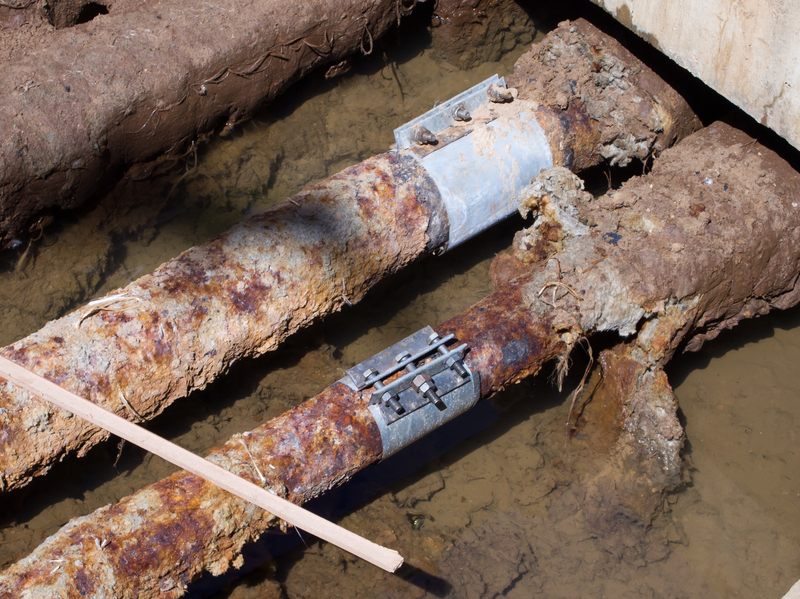North Dakota Materials and Ethics 30 PDH Discount Package 2
Lubricants and Hydraulic Fluids - Overview (T04-008)
Lubricants and Hydraulic Fluids - Types (T10-001)
Lubricants and Hydraulic Fluids: Applications (T07-003)
Structural Insulated Panels (SIPs) Used in Residential Wall Systems (T04-007)
Ethical Issue: Deciding if Something is a Gift or a Bribe (LE1-007)

This online engineering PDH course provides basic information on the chemical interaction taking place during the corrosion process between the environment and the corroding metal. It also describes preventive measure to minimize or control the corrosion process.
Uncontrolled corrosion can cause many serious problems. Corrosion occurs continuously, and every metal in every facility is subject to some type of corrosion. Even though corrosion cannot be eliminated, it can be controlled.
This 4 PDH online course is applicable to chemical and environmental engineers, design and construction personnel, technical staff and facility operators who are interested in gaining a better understanding of the theory of corrosion.
This PE continuing education course is intended to provide you with the following specific knowledge and skills:
- Corrosion theory
- General corrosion
- Crud and galvanic corrosion
- Specialized corrosion
In this professional engineering CEU course, you need to review Module 2, "Corrosion" of the Department of Energy Publication DOE-HDBK-1015/1-93, "Chemistry".
Upon successful completion of the quiz, print your Certificate of Completion instantly. (Note: if you are paying by check or money order, you will be able to print it after we receive your payment.) For your convenience, we will also email it to you. Please note that you can log in to your account at any time to access and print your Certificate of Completion.

This online engineering PDH course describes the basic principles, characteristics, properties, and applications of different types of lubricating oils.
This course is intended to be a practical guide to lubrication with enough technical detail to allow personnel to recognize and easily discern differences in performance properties specified in manufacturers' product literature so that the proper lubricant for a particular application is selected.
This 4 PDH online course is applicable to engineers, design and construction personnel, and other technical professionals who are interested in gaining a better understanding of lubricants.
This PE continuing education course is intended to provide you with the following specific knowledge and skills:
- Understanding the definition of friction and mechanisms of wear
- Understanding the basic principles of lubrication
- Learning about the different types and characteristics of lubricants
- Familiarizing with the applications of lubricants
- Learning about the basics of the lubrication oil and the production methods
In this professional engineering CEU course, you need to review Chapters 2 through 4 of the "Lubricants and Hydraulic Fluids" engineering manual, published by the United States Army of Corps of Engineers (USACE), Publication Number EM 1110-2-1424, dated January 29, 2016.
Upon successful completion of the quiz, print your Certificate of Completion instantly. (Note: if you are paying by check or money order, you will be able to print it after we receive your payment.) For your convenience, we will also email it to you. Please note that you can log in to your account at any time to access and print your Certificate of Completion.

This online engineering PDH course describes the basic properties of turbine oils, hydraulic fluids, grease, solid lubricants as well as self-lubricated materials, and environmentally acceptable lubricants.
This course is intended to be a practical guide to lubrication and hydraulic fluids with enough technical detail to allow personnel to recognize and easily discern differences in performance properties specified in manufacturers' product literature so that the proper lubricant for a particular application is selected. In addition, this course discusses the considerations required to adequately maintain the integrity of the lubricants and ensure their effective performance.
This 10 PDH online course is applicable to engineers, design and construction personnel, and other technical professionals who are interested in gaining a better understanding of lubricants and hydraulic fluids.
This PE continuing education course is intended to provide you with the following specific knowledge and skills:
- Familiarizing with the basic properties and applications of turbine oils
- Understanding the purpose, physical characteristics, quality requirements, operating factors, and types of hydraulic fluids
- Familiarizing with the function, characteristics, applications, and types of grease
- Learning the basics of solid lubricants and self-lubricated materials as well as their types, characteristics, application, and production methods
- Familiarizing with the various types of environmentally acceptable lubricants, associated standards, use cases, and physical characteristics
Upon successful completion of the quiz, print your Certificate of Completion instantly. (Note: if you are paying by check or money order, you will be able to print it after we receive your payment.) For your convenience, we will also email it to you. Please note that you can log in to your account at any time to access and print your Certificate of Completion.

This engineering online PDH course covers the lubricant specifications and selection, requirements of lubricants for different types of equipment as well as the operation and maintenance considerations.
This course is intended to be a practical guide to lubrication with enough technical detail to allow personnel to recognize and easily discern differences in performance properties specified in manufacturers' product literature so that the proper lubricant for a particular application is selected. In addition, this course discusses the considerations required to adequately maintain the integrity of the lubricants and ensure their effective performance.
This 7 PDH online course is applicable to engineers, design and construction personnel, and other technical professionals who are interested in gaining a better understanding of lubricants and hydraulic fluids.
This PE continuing education course is intended to provide you with the following specific knowledge and skills:
- Learning about the basic types of gears and the lubricants they require
- Understanding the basic characteristics of bearing lubrication and their application
- Familiarizing with the lubrication of miscellaneous applications including but not limited to stormwater pumps and motors, couplings, hoists and cranes, wire ropes, and chains
- Familiarizing with the operation, maintenance, and selection considerations of lubricants
Upon successful completion of the quiz, print your Certificate of Completion instantly. (Note: if you are paying by check or money order, you will be able to print it after we receive your payment.) For your convenience, we will also email it to you. Please note that you can log in to your account at any time to access and print your Certificate of Completion.

This online engineering PDH course provides prescriptive requirements for the use of structural insulated panels (SIPs) in wall systems in the construction of residential structures. These provisions include definitions, span tables, material requirements, and other related information appropriate for use by engineers, home builders, design professionals, and building code officials.
The Prescriptive Method for Structural Insulated Panels (SIPs) Used in Wall Systems in Residential Construction (Prescriptive Method) provides prescriptive requirements to facilitate the use of SIPs in wall systems for the construction of one- and two-family dwellings. By providing prescriptive provisions for the construction of typical homes with SIP systems, the need for engineering can be eliminated or reduced for most applications.
This 4 PDH online course is applicable to engineers, design professionals and construction personnel who are interested in gaining a better understanding of the design and installation considerations of structural insulated panels.
This PE continuing education course is intended to provide you with the following specific knowledge and skills:
- Familiarizing with the SIP materials, sizes and shapes
- Understanding the SIP foundation, wall and header requirements
- Understanding SIP connection details
- Understanding the utility requirements associated with SIP wall systems
- Understanding the thermal guidelines associated with SIP wall systems
Upon successful completion of the quiz, print your Certificate of Completion instantly. (Note: if you are paying by check or money order, you will be able to print it after we receive your payment.) For your convenience, we will also email it to you. Please note that you can log in to your account at any time to access and print your Certificate of Completion.

This online engineering PDH course will establish, through the presentation of many examples, the principles of distinguishing between a gift and a bribe.
The federal government has formulated detailed rules covering gifts given to executive-branch employees in many situations. The rules are published in the Code of Federal Regulations (CFR) and are illustrated through many examples. Even though the examples are intended for government employees (many of whom are engineers), they also apply to private-sector engineers in similar situations. This course presents selected CFR examples that furnish guidance on the ethics of gift giving in situations that are especially relevant to engineers.
This 1 PDH online course is intended for engineers seeking guidance on distinguishing between ethical gift-giving and bribery.
This PE continuing education course is intended to provide you with the following specific knowledge and skills:
- Familiarizing with definitions of a bribe and a gift
- Knowing the bribe status of a gift based on a personal relationship
- Understanding the conditions under which gifts to spouses are acceptable
- Knowing the need to avoid even the appearance of a gift being a bribe
- Recognizing when gifts involving free attendance at meetings and conferences are acceptable
- Understanding the importance of the cumulative effect of receiving even small gifts on a periodic basis
- Learning the importance of gifts received when on assignment rather than outside of work
Upon successful completion of the quiz, print your Certificate of Completion instantly. (Note: if you are paying by check or money order, you will be able to print it after we receive your payment.) For your convenience, we will also email it to you. Please note that you can log in to your account at any time to access and print your Certificate of Completion.